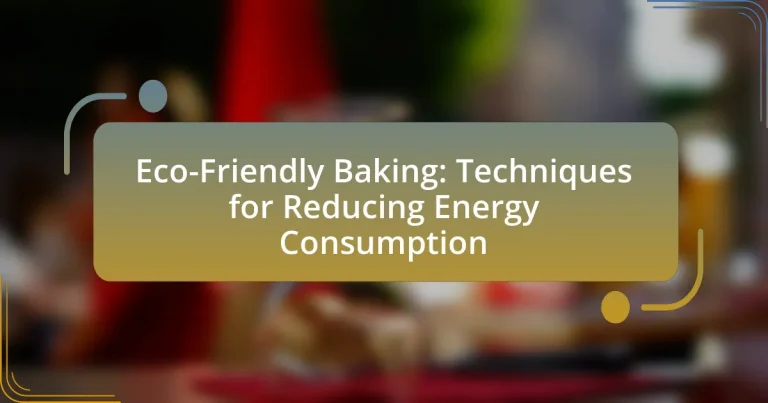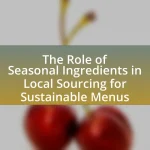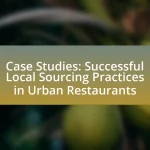Eco-friendly baking is the practice of preparing baked goods with methods and ingredients that minimize environmental impact, emphasizing sustainability through the use of organic and locally sourced ingredients, energy-efficient techniques, and sustainable packaging. This article explores the differences between eco-friendly and traditional baking, highlighting key principles such as reducing energy consumption and waste. It discusses various techniques for energy-efficient baking, including the use of convection ovens, batch baking, and effective oven management, while also addressing the importance of ingredient selection and equipment in achieving sustainability. Additionally, practical tips for home bakers and resources for further learning about eco-friendly practices are provided, underscoring the significance of reducing energy consumption in baking for both environmental and economic benefits.
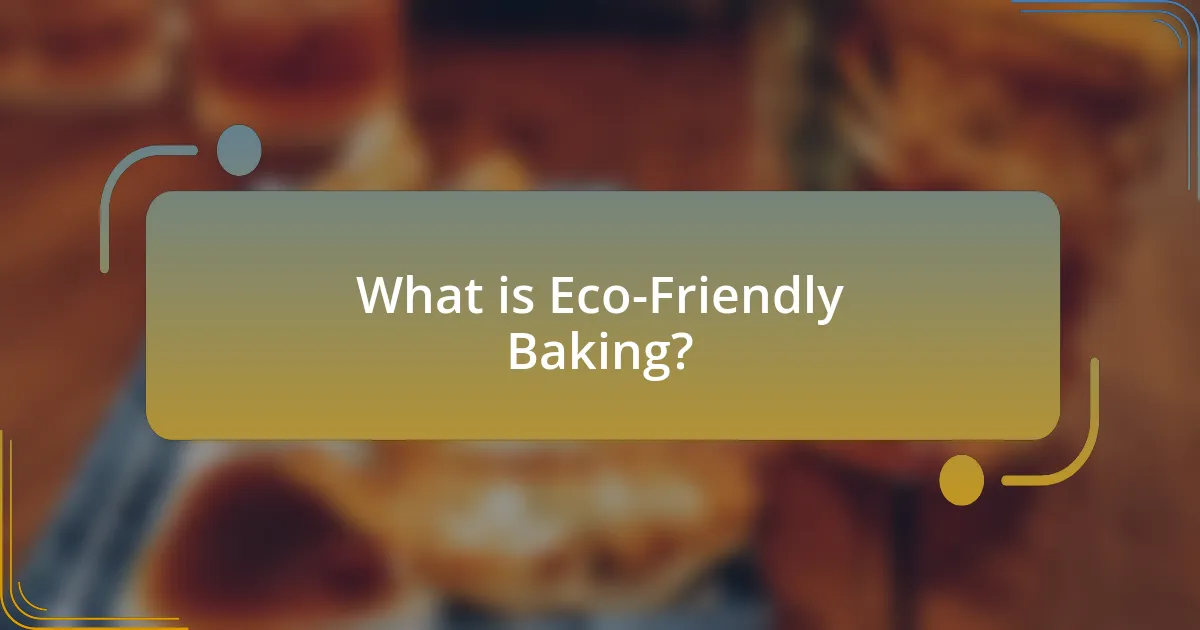
What is Eco-Friendly Baking?
Eco-friendly baking refers to the practice of preparing baked goods using methods and ingredients that minimize environmental impact. This includes utilizing organic and locally sourced ingredients, reducing energy consumption through efficient baking techniques, and employing sustainable packaging. For instance, using energy-efficient appliances can significantly lower electricity usage, while choosing organic ingredients helps reduce pesticide use and supports sustainable farming practices.
How does Eco-Friendly Baking differ from traditional baking?
Eco-Friendly Baking differs from traditional baking primarily in its emphasis on sustainability and reduced environmental impact. While traditional baking often utilizes conventional ingredients and methods that may contribute to higher energy consumption and waste, eco-friendly baking prioritizes organic, locally sourced ingredients and energy-efficient techniques. For instance, eco-friendly bakers may use renewable energy sources, such as solar power, and implement practices like batch baking to minimize energy use. This approach not only reduces carbon footprints but also supports local economies and promotes healthier food choices.
What are the key principles of Eco-Friendly Baking?
The key principles of eco-friendly baking include using sustainable ingredients, minimizing energy consumption, and reducing waste. Sustainable ingredients, such as organic flour and locally sourced produce, help lower the carbon footprint associated with transportation and chemical use. Minimizing energy consumption can be achieved by using energy-efficient appliances, baking in batches, and utilizing residual heat. Reducing waste involves practices like composting food scraps, reusing packaging, and opting for recyclable materials. These principles collectively contribute to a more environmentally responsible baking process.
Why is Eco-Friendly Baking important for the environment?
Eco-Friendly Baking is important for the environment because it minimizes resource consumption and reduces waste. Traditional baking methods often rely on high energy usage and non-sustainable ingredients, contributing to carbon emissions and environmental degradation. In contrast, eco-friendly baking techniques, such as using energy-efficient appliances and organic ingredients, significantly lower the carbon footprint associated with food production. For instance, studies show that using energy-efficient ovens can reduce energy consumption by up to 50%, thereby decreasing greenhouse gas emissions. Additionally, sourcing local and organic ingredients supports sustainable farming practices, which help preserve biodiversity and reduce pollution from chemical fertilizers and pesticides.
What are the main techniques used in Eco-Friendly Baking?
The main techniques used in eco-friendly baking include using energy-efficient appliances, sourcing local and organic ingredients, and implementing waste reduction practices. Energy-efficient appliances, such as convection ovens, reduce energy consumption by circulating hot air for even cooking. Sourcing local and organic ingredients minimizes transportation emissions and supports sustainable farming practices. Waste reduction practices, such as composting food scraps and using reusable baking materials, further contribute to eco-friendly baking by decreasing landfill waste and promoting sustainability.
How can ingredient selection impact energy consumption?
Ingredient selection significantly impacts energy consumption by influencing the efficiency of baking processes. For instance, using ingredients with higher moisture content, such as fruits or vegetables, can reduce the need for additional water and energy during mixing and baking. Additionally, selecting whole grains instead of refined flours can enhance the nutritional profile while potentially requiring less energy for processing. Research indicates that substituting traditional ingredients with alternatives like almond flour or coconut sugar can also lead to lower energy usage due to their unique properties, which may require shorter baking times or lower temperatures. Thus, careful ingredient selection not only affects the final product’s quality but also plays a crucial role in minimizing energy consumption in baking.
What role does equipment play in Eco-Friendly Baking?
Equipment plays a crucial role in eco-friendly baking by enhancing energy efficiency and minimizing waste. Energy-efficient appliances, such as convection ovens and induction cooktops, reduce energy consumption by distributing heat more evenly and cooking food faster, which can lead to significant energy savings. For instance, convection ovens can use up to 20% less energy compared to traditional ovens. Additionally, using durable, high-quality baking tools reduces the need for frequent replacements, thereby decreasing material waste. The choice of equipment directly impacts the overall sustainability of the baking process, aligning with eco-friendly practices aimed at reducing environmental footprints.

How can energy consumption be reduced in baking?
Energy consumption in baking can be reduced by optimizing oven use and implementing energy-efficient practices. Utilizing convection ovens, which circulate hot air, can decrease baking time and temperature by about 20-25%, leading to lower energy usage. Additionally, preheating only when necessary and baking multiple items simultaneously can maximize oven efficiency. Research indicates that using insulated baking sheets and pans can also help retain heat, further reducing energy consumption.
What are some energy-efficient baking methods?
Energy-efficient baking methods include using convection ovens, baking in batches, and utilizing residual heat. Convection ovens circulate hot air, reducing cooking time and temperature by about 25%, which leads to lower energy consumption. Baking in batches maximizes oven use, allowing multiple items to be cooked simultaneously, thus saving energy. Additionally, utilizing residual heat by turning off the oven a few minutes before the baking time ends can further decrease energy usage, as the retained heat continues to cook the food. These methods collectively contribute to significant energy savings in baking practices.
How does batch baking contribute to energy savings?
Batch baking contributes to energy savings by maximizing the use of oven space and reducing the frequency of heating cycles. When multiple items are baked simultaneously, the oven operates more efficiently, as it maintains a consistent temperature for a longer duration, minimizing energy loss. Research indicates that batch baking can reduce energy consumption by up to 30% compared to baking items individually, as it optimizes the thermal efficiency of the oven and decreases the overall cooking time needed for multiple batches.
What is the significance of oven management in reducing energy use?
Oven management is significant in reducing energy use as it optimizes the baking process, leading to lower energy consumption. Effective oven management techniques, such as preheating only when necessary, utilizing the right temperature settings, and minimizing door openings, can decrease energy waste. For instance, studies indicate that maintaining consistent temperatures and using convection settings can reduce energy use by up to 20% compared to traditional baking methods. By implementing these strategies, bakers can achieve energy efficiency while maintaining product quality.
What are the benefits of reducing energy consumption in baking?
Reducing energy consumption in baking leads to cost savings, environmental benefits, and improved efficiency. By using energy-efficient appliances and techniques, bakers can lower their utility bills, as energy costs account for a significant portion of operational expenses in commercial baking. Additionally, decreased energy use contributes to a reduction in greenhouse gas emissions, aligning with sustainability goals. For instance, the U.S. Department of Energy states that energy-efficient practices can reduce energy consumption by 10-30%, which not only conserves resources but also enhances the overall sustainability of baking operations.
How does energy reduction affect baking costs?
Energy reduction directly lowers baking costs by decreasing utility expenses associated with electricity and gas usage. For instance, implementing energy-efficient ovens can reduce energy consumption by up to 30%, leading to significant savings on monthly energy bills. Additionally, optimizing baking processes, such as using convection ovens that circulate hot air, can further enhance efficiency and reduce cooking times, which also contributes to lower operational costs. According to the U.S. Department of Energy, energy-efficient appliances can save businesses thousands of dollars annually, reinforcing the financial benefits of energy reduction in baking operations.
What environmental impacts are mitigated through energy-efficient baking?
Energy-efficient baking mitigates several environmental impacts, primarily reducing greenhouse gas emissions and conserving natural resources. By utilizing less energy, energy-efficient baking decreases the carbon footprint associated with energy production, which is often reliant on fossil fuels. For instance, studies indicate that energy-efficient ovens can reduce energy consumption by up to 30%, leading to significant reductions in CO2 emissions. Additionally, this approach conserves water and raw materials, as less energy usage often correlates with lower resource extraction and processing demands. Therefore, energy-efficient baking contributes to a more sustainable food production system by addressing climate change and resource depletion.
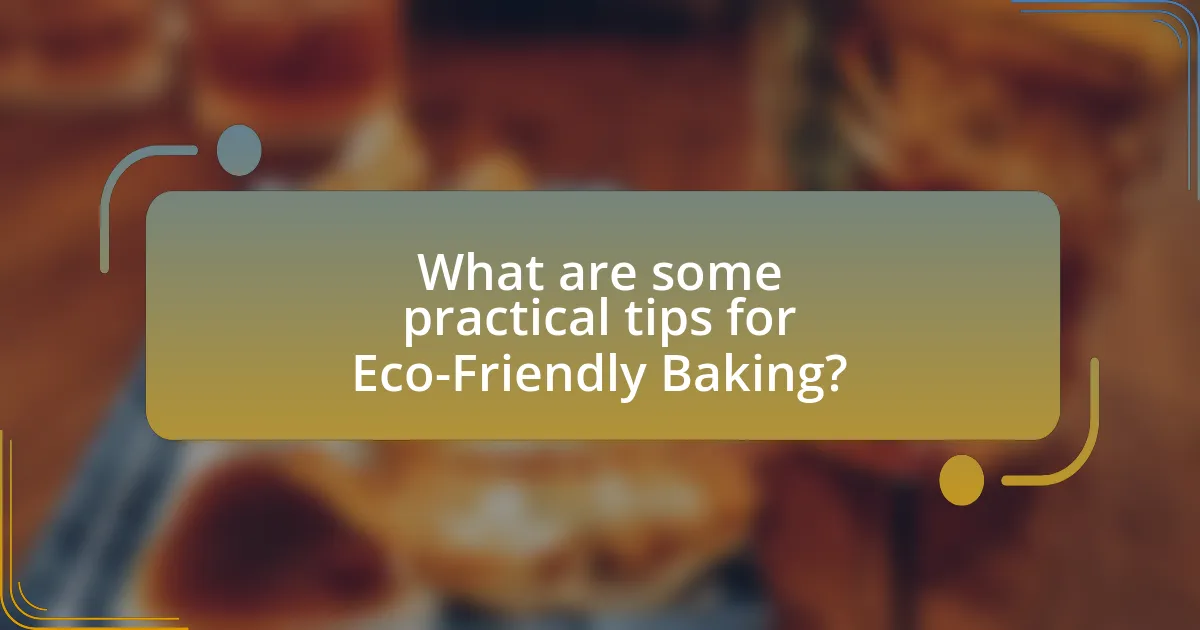
What are some practical tips for Eco-Friendly Baking?
Practical tips for eco-friendly baking include using energy-efficient appliances, opting for organic and local ingredients, and minimizing food waste. Energy-efficient appliances, such as convection ovens, use less energy by circulating hot air, reducing cooking time. Choosing organic and local ingredients supports sustainable farming practices and reduces carbon footprints associated with transportation. Additionally, minimizing food waste can be achieved by measuring ingredients accurately and repurposing leftovers, which contributes to a more sustainable baking process. These practices collectively promote environmental responsibility in baking.
How can home bakers implement Eco-Friendly practices?
Home bakers can implement eco-friendly practices by using energy-efficient appliances, sourcing local and organic ingredients, and minimizing waste. Energy-efficient appliances, such as convection ovens, consume less energy and reduce overall carbon footprints. Sourcing local and organic ingredients supports sustainable farming practices and reduces transportation emissions. Additionally, minimizing waste can be achieved by repurposing leftover ingredients and using reusable baking materials, which further decreases environmental impact. These practices collectively contribute to a more sustainable baking process.
What are some common mistakes to avoid in Eco-Friendly Baking?
Common mistakes to avoid in eco-friendly baking include using non-organic ingredients, which can contribute to environmental harm due to pesticide use, and neglecting to measure ingredient quantities accurately, leading to food waste. Additionally, preheating the oven unnecessarily wastes energy; instead, consider using the oven’s residual heat. Another mistake is overlooking the importance of energy-efficient appliances; using older models can significantly increase energy consumption. Lastly, failing to utilize seasonal and local ingredients can lead to a larger carbon footprint due to transportation emissions. These practices not only undermine the eco-friendly intent but also diminish the overall sustainability of baking efforts.
How can bakers measure their energy consumption effectively?
Bakers can measure their energy consumption effectively by utilizing energy monitoring devices that track electricity usage in real-time. These devices provide detailed insights into energy consumption patterns, allowing bakers to identify peak usage times and specific equipment that consumes the most energy. For instance, studies show that commercial ovens can account for up to 30% of a bakery’s total energy use, making it crucial for bakers to monitor their performance. By analyzing this data, bakers can implement strategies to optimize energy efficiency, such as scheduling baking during off-peak hours or upgrading to energy-efficient appliances.
What resources are available for learning more about Eco-Friendly Baking?
Books, online courses, and websites are valuable resources for learning about Eco-Friendly Baking. Notable books include “The Eco-Friendly Baker” by Sarah K. and “Sustainable Baking” by Emma L. which provide techniques and recipes focused on sustainability. Online platforms like Coursera and Udemy offer courses on sustainable cooking practices, including eco-friendly baking methods. Additionally, websites such as the Environmental Working Group and the Sustainable Food Trust provide articles and guides on reducing energy consumption in baking, emphasizing the importance of using local ingredients and energy-efficient appliances.
Where can bakers find eco-friendly recipes and techniques?
Bakers can find eco-friendly recipes and techniques on websites dedicated to sustainable cooking, such as the Environmental Working Group and the Sustainable Food Trust. These platforms provide a variety of resources, including recipes that utilize organic ingredients and methods that minimize energy consumption. Additionally, cookbooks focused on sustainable baking, like “The Green Baker” by Aimee Wimbush-Bourque, offer practical guidance on eco-friendly practices. These sources are validated by their commitment to promoting environmentally responsible cooking and baking methods.
What organizations promote sustainable baking practices?
Organizations that promote sustainable baking practices include the Sustainable Food Trust, the Bread Lab, and the Whole Grains Council. The Sustainable Food Trust advocates for sustainable food systems and practices, emphasizing the importance of environmentally friendly methods in baking. The Bread Lab focuses on research and education around sustainable grain production and baking techniques, promoting local and organic ingredients. The Whole Grains Council encourages the use of whole grains in baking, which supports health and sustainability by reducing waste and promoting biodiversity. These organizations provide resources, research, and community support to foster eco-friendly baking practices.
What are the best practices for sustainable baking at home?
The best practices for sustainable baking at home include using local and organic ingredients, minimizing food waste, and optimizing energy use. Utilizing local and organic ingredients reduces carbon footprints associated with transportation and chemical fertilizers, while minimizing food waste can be achieved by measuring ingredients accurately and repurposing leftovers. Additionally, optimizing energy use involves preheating the oven only when necessary, using energy-efficient appliances, and baking multiple items at once to maximize energy consumption. These practices contribute to a more sustainable baking process by lowering environmental impact and promoting resource conservation.
